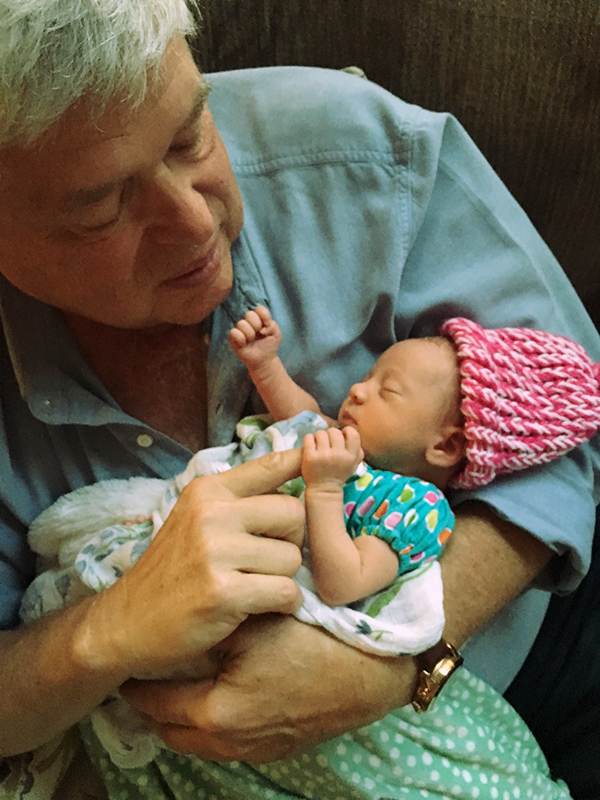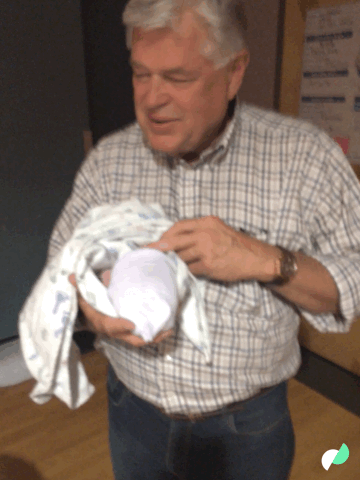 My son Laird and his lovely wife Sadie have gone and done it, they have brought a baby girl into my family at last. I have two great sons and three grandsons, but have really wanted a granddaughter. Granddad was ready for a girl. My first granddaughter (wow!) Arielle is a beautiful little girl, just 4lbs 11oz. at birth, strong and healthy and after her first week doing spectacularly well.
My son Laird and his lovely wife Sadie have gone and done it, they have brought a baby girl into my family at last. I have two great sons and three grandsons, but have really wanted a granddaughter. Granddad was ready for a girl. My first granddaughter (wow!) Arielle is a beautiful little girl, just 4lbs 11oz. at birth, strong and healthy and after her first week doing spectacularly well.
In the case of our little Arielle, the first thing I do when I see her is smile—actually it’s probably more of a big grin. She is just such a wonderful miracle, and I am so happy to have her with us and thrilled for my son and his wife. After I do the silly grin thing with her, I do what I do with all babies.
When I look at babies, and my little granddaughter is no exception, I have to bite my tongue to not say “what?” out loud. In reality I generally lose the battle and just say it—“what?” Then look around to see the expressions on people’s faces as they wonder what I’m doing asking questions of a tiny baby, “what is going on in that new little brain?”
Yesterday, as I watched Ari stare at my face and start tracking me as I moved from side to side I couldn’t help but wonder what she was processing. You don’t pay attention to something unless you are actually processing something. Is her brain perhaps already putting together the first pieces that are going to build into a uniquely special Arielle composite that is going to be Granddad? I think so. Then I ask myself the question, “what can we help you become?”
I believe she was born with a lot of things, her genetics are going to have a great influence on how tall she will be, what color hair she will have, how much she favors my son or his wife, and to some extent her personality is probably a bit hardwired. Certainly there are some unique innate intelligence and intelligences that are hardwired as well. But, I don’t believe these things have a lot to do with Ari’s or any other child’s potential to have a happy, wonderful life or to be smart, educated and free to pursue her passions. How close she comes to realizing the dream of a wonderful life is going to be primarily a reflection of her opportunities, not her genetics. My son and his wife realize this and were ready to assume this tremendous responsibility before they made the conscious decision to bring her into this world. They are going to be fantastic parents and I will be delighted to take this journey with them, as will the rest of her family. Children bring to families a lot of responsibility, tremendous love, hope, joy, and a bump or two (or a hundred) to keep it interesting.
I don’t wish to be prejudiced, but I have got the darn cutest little granddaughter on the planet and its really going to be tough to not spoil her really bad, but then again you can’t really give a granddaughter too much love—right?
As I ponder Arielle’s future and what she is going to bring to our lives and we to hers I can’t help but be a bit sad thinking about all of those children who have virtually no opportunities, let alone wonderful opportunities. We need to acknowledge this imperative and figure out ways to make some changes.
A special thanks to little Ari from Granddad—I really appreciate your being aware of my travel schedule and coming early so I could be there to help welcome you into the world.
And, now for the rest of the story…

